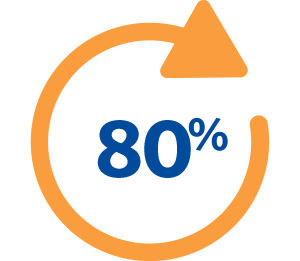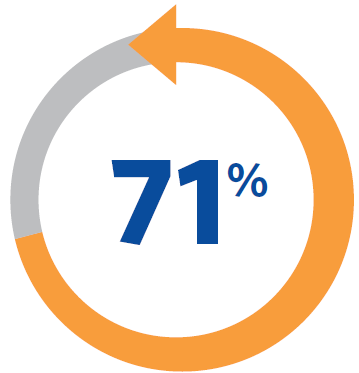Data-Driven Outcomes Reporting
As part of our commitment to research and quantifiable performance, Hillside incorporates data-driven methods into our programs and services that enable the continuous review of our performance, and the measurement of true and meaningful impact. This consistent emphasis on measurement allows our agency to create the best possible outcomes among those we serve, with the highest value to our funders and communities.
Hillside publishes annual Outcomes Reports that track the measurable performance of agency-wide programs and priorities during each fiscal year. Data from the 2024 fiscal year are featured below.
Fiscal Year 2024 – Youth, Adults & Families Served
The data below reflect outcomes for Hillside services provided from July 1, 2023 through June 30, 2024.

Gender
55% Female
44% Male
<1% Non-Binary

Age
10% Birth-10 years
62% 11-18 years
10% 19-26 years
18% 27+ years

Race & Ethnicity
29% Black/African-American
27% White
12% Hispanic/Latino
8% Multi-Racial
24% Other
Youth & Families Served by Program*
Care Management for Adults**
Care Management for Children**
Day Treatment Education
Developmental Disabilities
Early Childhood Development
Family Development
Foster Care
Home and Community-Based Services
Permanency Services
Preventive Services
Residential Treatment
Youth Development
Hillside provided services in partnership with 8,721 families*
*Total served may differ from the sum of all program areas due to individuals being enrolled in multiple programs.
**Care Management totals include children and adults actively enrolled at any point during the fiscal year.
Risk Factors
Upon admission to a Hillside program*** in FY 2024, individuals presented with the following risk factors:
- Adverse Experiences & Trauma 92%
- Mental Health Disorders or Diagnoses 88%
- Education Challenges 86%
- Violent Behaviors & Exposure 83%
- Suicidal Attempts, Ideation, Self-Harming Behaviors 64%
- Runaway/Wandering Behaviors 55%
- Sexually Harmful Behaviors 46%
- Substance Use/Abuse 43%
- Legal Challenges (arrests, incarceration, involvement with legal system) 24%
***Excludes Hillside Work-Scholarship Connection participants.
Adverse Childhood Experiences
Upon admission to a Hillside program, youth and families complete a questionnaire to identify Adverse Childhood Experiences. Frequent or prolonged ACE exposure can affect a developing brain and create significant long-term health impacts, but early intervention can reduce those risks.
Among individuals entering Hillside programs*** in FY 2024, the most frequently indicated ACEs included:
- Parental Separation or Divorce 73%
- Household Mental Health Problems 57%
- Emotional Abuse 49%
- Household Alcohol or Drug Use Problems 48%
4.5
OUT OF 10
Average ACE score among individuals in Hillside programs. A score of 4 or higher indicates substantially increased lifetime risk.
***Excludes Hillside Work-Scholarship Connection participants.
Fiscal Year 2024 – Outcomes at Discharge
By partnering with Hillside programs and staff, youth and adults can expect to enjoy safer, healthier lives within their families and communities.
Positive Results
Upon discharge from select programs in FY 2024:

of individuals were living with their families, in adoptive homes or independently

were able to transition to less intensive levels of care
Family Satisfaction
Based on surveys conducted with families served by Hillside in FY 2024:

of families were highly satisfied with services received and highly likely to recommend Hillside programs to family members and friends
Building Social-Emotional Well-Being
The Developmental Assets Profile measures assets that affect social-emotional well-being. Youth in most Hillside services complete this assessment upon admission and again at discharge. Among youth discharged in FY 2024:

increased their overall number of assets from admission to discharge

in the “challenged and vulnerable” range at admission increased their overall number of assets at discharge
Strengthening Connections & Support
Hillside uses the Youth Connections Scale in many services to measure relational permanency and supports that are critical to a young person’s long-term success.

of youth discharged in FY 2024 increased their connections and supports between admission and discharge
Assessing Family Function
Upon admission and discharge from applicable Hillside programs, families complete the North Carolina Family Assessment Scale (NCFAS) to measure improvements in family functioning that occurred during the time services were received. NCFAS domains include Environment, Parental Capabilities, Family Interactions, Family Safety, Child Well-Being, Social/Community Life, Self-Sufficiency, Family Health, Caregiver/Child Ambivalence and Readiness for Reunification. During FY 2024,

of families reported improved family functioning
Download Outcomes Reports
Click on any image to view or download complete past years’ Outcomes Reports for Hillside programs and Hillside Work-Scholarship Connection.
Hillside
Outcomes Reports
Hillside Work-Scholarship Connection
Outcomes Reports


